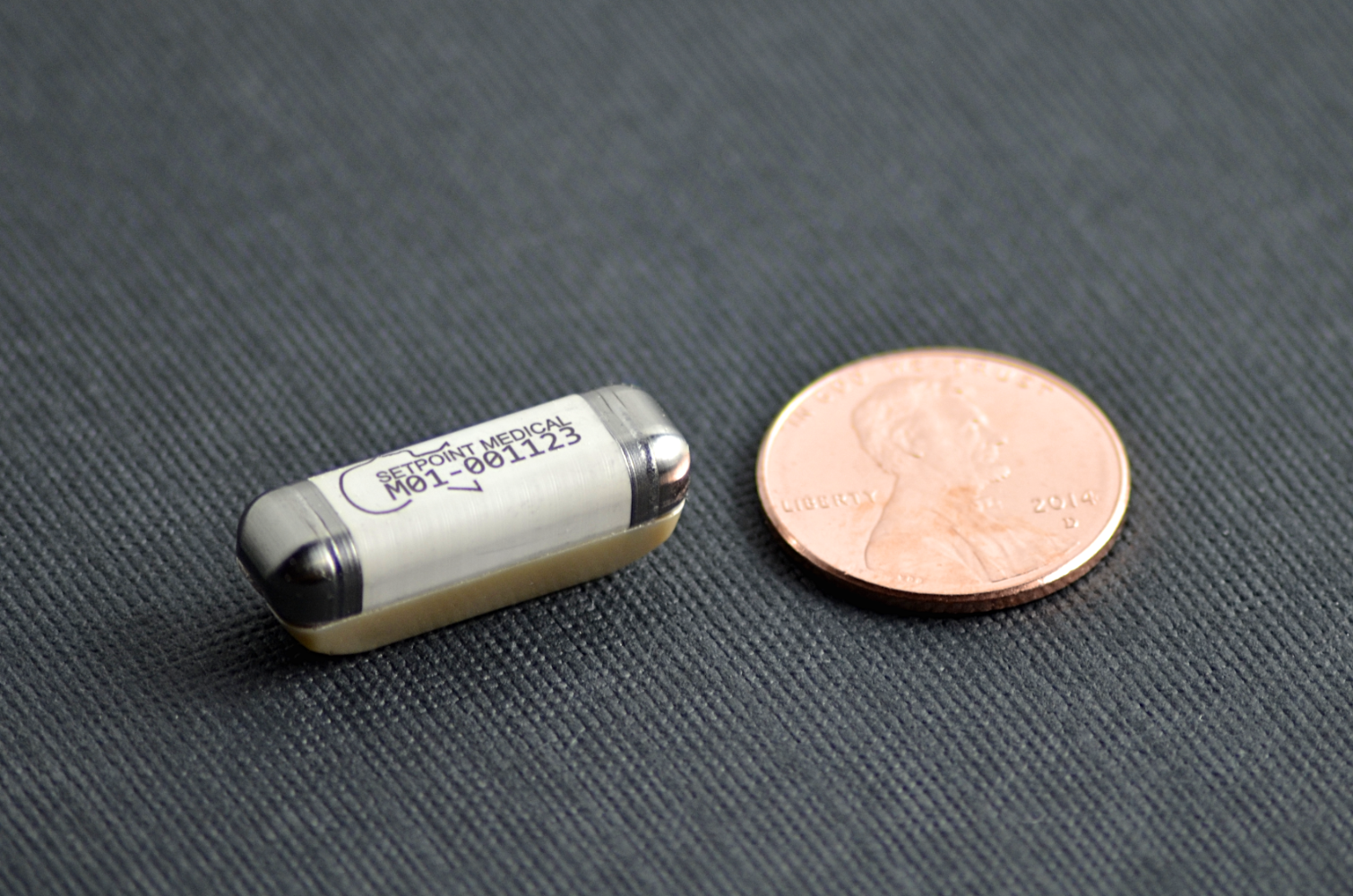
Credit: SetPoint Medical
A tiny, electronic device could provide relief to those suffering from rheumatoid arthritis (RA) who want to forego traditional treatment options that are often expensive and can lead to debilitating side effects.
SetPoint Medical, a California-based clinical-stage biomedical technology company, is currently conducting a pilot trial using their new microregulator, an implanted device the size of a coffee bean that could treat RA without needing pills or injectable treatments.
David Chernoff, MD, the chief medical officer of SetPoint, explained in an interview with R&D Magazine that the new device targets the vagus nerve, the longest nerve in the body, to treat the inflammation associated with RA without leaving the body susceptible to infections.
“What SetPoint has been pursuing is quite different in that we are not using pills or injectables to target the immune system,” Chernoff said. “The idea here is to exploit or augment what nature has developed for humans.
“The way we do that is we tickle the vagus nerve with electricity because when we do that we are actually activating a pathway that was designed over time to dial back inflammation when you need to do that without having to introduce foreign chemicals or immunosuppressant drugs.”
The wireless microregulator device, which is less than one inch long, can be programmed and recharged as needed. Chernoff said current estimations have the battery lasting about a decade.
The device generates precise electrical pulses using an integrated circuit, telemetry hardware and a rechargeable battery enclosed in a ceramic and titanium case.
A wireless charging collar and iPad-based prescription application will enable both the patient and physician to charge and monitor the device.
SetPoint is currently conducting the first in-human trial to evaluate the proprietary device and has 15 patients in the U.S.The vagus nerve can detect inflammation in the body and transmit the signal back and forth between the inflamed area and the brain. Normally, the body has a natural ability to dial back inflammation. However, when someone is suffering from an autoimmune disease, this ability is compromised, leading to chronic, unresolved inflammation.
Researchers have long-known, dating back to the 1880s, that stimulation of the vagus nerve—which starts at the brain stem and splits into two branches to travel through the neck, chest and abdomen—could suppress seizures.
Chernoff explained that while current medication to treat RA is effective, it also comes with dangerous side effects that a bioelectronics approach could eliminate.
“Right now, the paradigm for treating RA and related autoimmune diseases is to use a series of medications that are designed to suppress the immune system because there is an overactive immune response, particularly to joints,” he said. “The side effect of that is it increases your propensity or risk of having serious infections.
“We believe that the electronic version of the therapy not only can be effective for these patients, but fundamentally it does not affect your ability to respond to infection the way that these other drugs do,” he added.
According to Chernoff, the medication is also very expensive and not every patient responds to it. A typical year of treatment, he said, could cost upwards of $50,000, with the drugs eventually losing effectiveness.
In recent years, SetPoint has conducted proof of concept studies in Europe using a similar device currently used to treat epilepsy that was modified for patients of RA and Crohn’s disease who have failed to respond to traditional treatments. While the new device is smaller, Chernoff said the devices used for the European study is bulky and resembles a pacemaker.
During the study, 17 volunteers with moderate to severe RA symptoms were implanted with the device. The early results showed that bioelectronics therapy reduced symptoms significantly for at least 12 of the patients and inhibited cytokine production at three months.
Following the completion of the primary study, all 17 patients opted to continue treatment in a two-year follow-up study. After 24 months, 87 percent of the participants reported a meaningful response. The improvements were maintained in patients with and without concurrent use of biologic agents.
“We are very enthusiastic about progress so far, we are going to starting a much larger, pivotal trial next year using this approach and we hope that this will provide a disruptive and new form of therapy for people who have either lost other options or can’t comply with the conventional medications,” Chernoff said. “We don’t think this is going to replace what’s out there, we think that it will augment and provide more choices.”
Rheumatoid arthritis is a chronic inflammatory disease that affects 1.5 million people in the United States and costs tens of billions of dollars annually to treat. According to Chernoff, the disease predominantly attacks people during their working years, often in their 40s. It also is more common in women and can lead to permanent disability.
SetPoint Medical, headquartered in Valencia, Ca., was founded in 2007 by Kevin Tracey, MD, of the Feinstein Institute for Medical Research in Manhasset, NY, and Shaw Warren, MD, of Massachusetts General Hospital and Harvard University in Boston.




